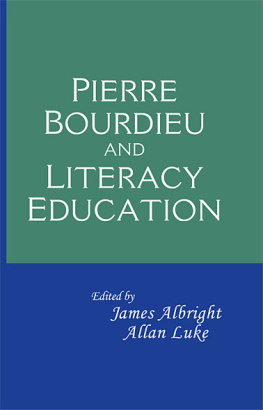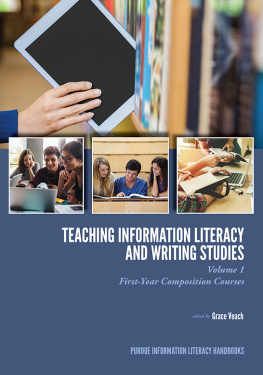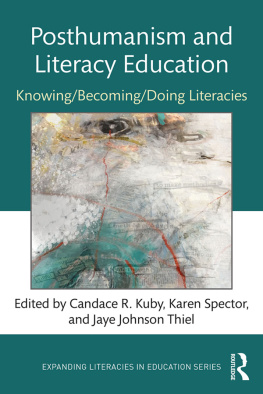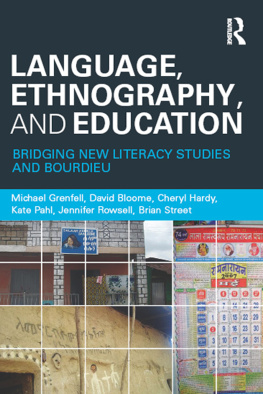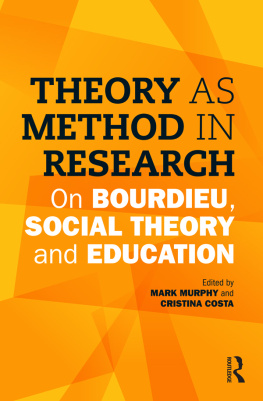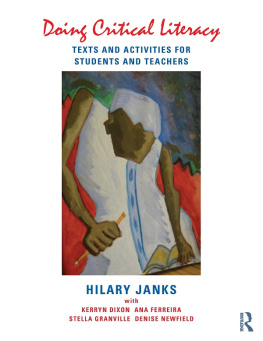Pierre Bourdieu and Literacy Education
A unique attempt to deepen current understanding and use of Bourdieu in educational theory and practice. This volume promises to be a leading resource for literacy researchers seeking to investigate the theories of Bourdieu.
Joanne Larson, University of Rochester, New York, United States
In this volume, scholars from around the world focus on how a Bourdieusian stance can enable a powerful sociocultural and cultural analysis of literacy education theory and practice and serve as an effective tool in analyzing relations of hierarchy and domination. Although there has been a growing body of Bourdieusian-inspired research in various sectors of education, this book is the first to present both theoretical and practical articulation of his ideas in the field of literacy education. It brings together three major clusters of work:
rethinkings of the doxa of the social fields of language and literacy education;
explorations of alternative objectifications of educational fields forming around cultural and linguistic minorities, new media and technologies;
studies on the formation of the literate habitus in homes and classrooms, curriculum and schooling, and addresses theoretical, policy and practical directions.
Pierre Bourdieu and Literacy Education is intended for researchers, practitioners, and graduate students in literacy education, sociology of education, and curriculum theory, and as a text for advanced courses in these areas.
Pierre Bourdieu and Literacy Education
Edited by
James Albright
National Institute of Education,
Singapore
and Allan Luke
Queensland University of
Technology, Australia

NEW YORK AND LONDON
First published 2008
by Routledge
270 Madison Ave, New York, NY 10016
Simultaneously published in the UK
by Routledge
2 Park Square, Milton Park, Abingdon, Oxon OX14 4RN
Routledge is an imprint of the Taylor & Francis Group, an informa business
This edition published in the Taylor & Francis e-Library, 2007.
To purchase your own copy of this or any of Taylor & Francis or Routledges collection of thousands of eBooks please go to www.eBookstore.tandf.co.uk.
2008 Taylor & Francis
All rights reserved. No part of this book may be reprinted or reproduced or utilized in any form or by any electronic, mechanical, or other means, now known or hereafter invented, including photocopying and recording, or in any information storage or retrieval system, without permission in writing from the publishers.
Trademark Notice: Product or corporate names may be trademarks or registered trademarks, and are used only for identification and explanation without intent to infringe.
Library of Congress Cataloging-in-Publication Data
Pierre Bourdieu and literacy education / editors James Albright and Allan Luke.
p. cm.
Includes bibliographical references and index.
ISBN 978-0-8058-5687-3 (hardback : alk. paper)ISBN 978-0-203-93750-1 (e-book) 1. LiteracySocial aspects. 2. Bourdieu, Pierre, 19302002. I. Albright, James. II. Luke, Allan.
LC149.P54 2008
302.2'244dc22
2007025261
ISBN13: 978-1-135-59949-2 ePub ISBN
ISBN10: 0-805-85687-0 (hbk)
ISBN10: 0-203-93750-3 (ebk)
ISBN13: 978-0-805-85687-3 (hbk)
ISBN13: 978-0-203-93750-1 (ebk)
Contents
JAMES ALBRIGHT AND ALLAN LUKE |
JAMES ALBRIGHT AND ALLAN LUKE |
JAMES ALBRIGHT |
CLAIRE KRAMSCH |
MONICA HELLER |
ALLAN LUKE |
ALLON J. UHLMANN |
MARK DRESSMAN AND PHILLIP WILDER |
MARC LAMONT HILL |
RACHEL A. GRANT AND SHELLEY D. WONG |
KATE PAHL |
TARA GOLDSTEIN |
JENNIFER ROWSELL |
JESSICA ZACHER |
MARY JANE CURRY |
ROBERT J. BRACEWELL AND STEPHEN P. WITTE |
JAMES ALBRIGHT |
ALLAN LUKE |
JAMES COLLINS |
Illustrations
Figures
| 10.1 | Fatihs prayer bead map |
| 10.2 | Edwards drawing of Nannys farm in Wales |
| 10.3 | Heuristic model of how practices are sedimented into texts |
| 12.1 | Installation of burning dress |
| 12.2 | Making old look new |
| 12.3 | African-style woodcut of All the Worlds a Stage |
| 12.4 | Fatherhood |
| 12.5 | The process of improvising on habitus in the fields of creative production |
| 13.1 | Christina and Vanessas map of friendship groups in Room 126 |
| 13.2 | Christinas Ta Tamara |
| 15.1 | Leontyevs schematic triangle |
| 15.2 | The activity triangle |
| 15.3 | The semiotic triangle |
Tables
| 10.1 | The data set |
| 13.1 | My own list of friendship groups in Room 126 |
| 14.1 | Profile of BW3 students |
Preface
James Albright and Allan Luke
This book is a generative set of theoretical, narrative, empirical, and practical applications of Bourdieusian concepts to and around the field of language and literacy education. It offers three major clusters of work: rethinkings of the doxa of the social fields of language and literacy education (Albright, Kramsch, Heller, Luke); explorations of alternative objectifications of educational fields forming around cultural and linguistic minorities, new media and technologies (Uhlmann, Dressman and Wilder, Hill, Wong and Grant); and studies on the formation of the literate habitus in homes and classrooms, curriculum and schooling (Pahl, Goldstein, Rowsell, Zacher, Curry, Bracewell and Witte). We conclude with three essays on future theoretical, policy and practical directions (Albright, Luke, Collins). The volume brings together scholars who have focused their work on Bourdieu and social theoretic approaches to literacy over a period of time with a current generation of critical scholars, teacher educators, and researchers who have turned to Bourdieu to address and redress what they perceive as systematic inequities that are generated by the schools, their affiliated language-in-education policies, and their everyday practices.
Our interest here is in new studies, new combinatory theoretical models that use Bourdieu as a departure or arrival point, and renewing the application of Bourdieus ideas to the study of those students, communities, and systems that historically have been marginalized by mainstream schooling. The theme of how to alter and shift the flows of capital in the social fields of educational institutions runs across these authors works. In commissioning and editing these pieces, we have avoided a systematic overview of Bourdieus model and theories and how these might apply to language, literacy, and education. This has been done capably over the past two decades in accessible and cited work (e.g., Collins, 1993; Cook-Gumperz, 1986; Grenfell and James, 1998; Luke, 1996; Norton, 1996). That work has applied Bourdieus sociology to the face-to-face formation of habitus, the operations of state and schooling as social fields, resultant differential formations of capital, and attendant reproductive effects upon particular communities and cultures.

